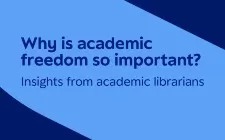The Chilling Impact of Censorship in Higher Education
College and university campuses have long been seen as bastions of free speech and intellectual discourse. These institutions are meant to be a safe space for students to explore new ideas, challenge their beliefs, and engage in critical thinking. However, in recent years, there has been a growing trend of censorship on college campuses, stifling the very principles that higher education stands for.
Perhaps because college students are generally considered adults, and college campuses are seen as places to foster independent thinking, there has been a misconception that censorship is not an issue in higher education. However, this could not be further from the truth. Censorship in higher education is a growing concern, and its impact is chilling.
One of the most alarming forms of censorship in higher education is the silencing of controversial or unpopular opinions. In an effort to create a “safe space” for students, some universities have implemented policies that restrict certain types of speech. This includes banning speakers with opposing views, disinviting speakers who have been invited by student groups, and even canceling events altogether. While the intention may be to protect students from offensive or harmful ideas, this type of censorship only serves to limit the diversity of thought and stifle open dialogue.
Censorship also extends to the classroom, where professors may feel pressure to avoid certain topics or viewpoints in order to avoid controversy. This not only limits academic freedom but also deprives students of the opportunity to engage in critical thinking and learn from different perspectives. In some cases, students may even self-censor, fearing backlash from their peers or professors if they express an unpopular opinion.
The impact of censorship in higher education goes beyond limiting free speech. It also has a chilling effect on academic research and scholarship. When certain topics or viewpoints are deemed off-limits, it hinders the pursuit of knowledge and the advancement of academic discourse. This not only affects the quality of education but also undermines the credibility of higher education institutions as a whole.
Moreover, censorship in higher education can have serious consequences for students’ future careers. In today’s highly competitive job market, employers value critical thinking and the ability to engage in respectful debate. By limiting these skills in the college setting, students may be ill-prepared for the real world and struggle to succeed in their chosen fields.
It is important to note that censorship in higher education is not limited to the suppression of conservative or controversial views. In fact, it can occur on both ends of the political spectrum. The issue at hand is not about which ideas are right or wrong, but rather the importance of allowing all ideas to be heard and debated in a respectful manner.
So, what can be done to combat censorship in higher education? First and foremost, it is crucial for universities to uphold their commitment to academic freedom and free speech. This means creating an environment where all ideas, no matter how controversial, can be expressed and debated without fear of censorship or retribution.
Additionally, universities must promote diversity of thought and encourage students to engage in respectful dialogue with those who hold different viewpoints. This not only fosters critical thinking but also promotes a culture of open-mindedness and understanding.
It is also important for students to be aware of their rights and to speak out against censorship when they see it happening. This can be done through student organizations, petitions, and open letters to university administrations. By standing up for free speech and academic freedom, students can help create a more inclusive and intellectually stimulating environment on their campuses.
In conclusion, censorship in higher education is a growing concern that has a chilling impact on free speech, academic freedom, and the pursuit of knowledge. It is essential for universities to uphold their commitment to these principles and for students to actively promote a culture of open dialogue and diversity of thought. Only then can we truly fulfill the purpose of higher education – to educate and empower the next generation of leaders and critical thinkers.

